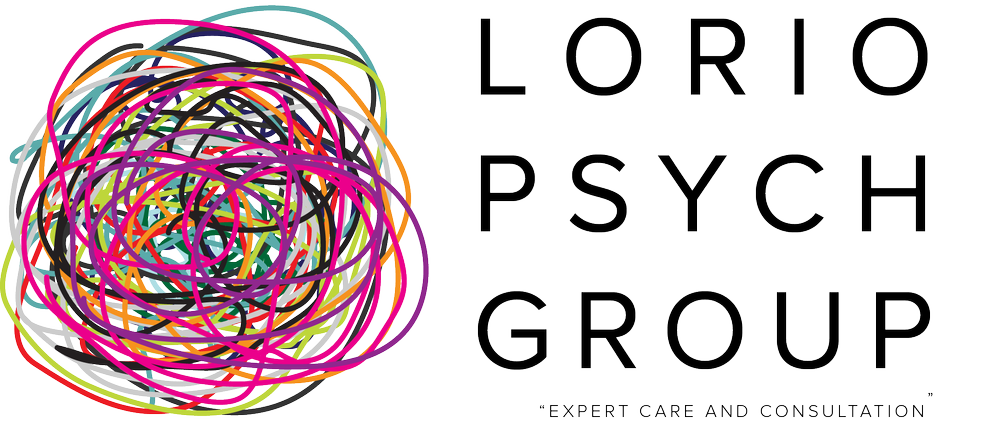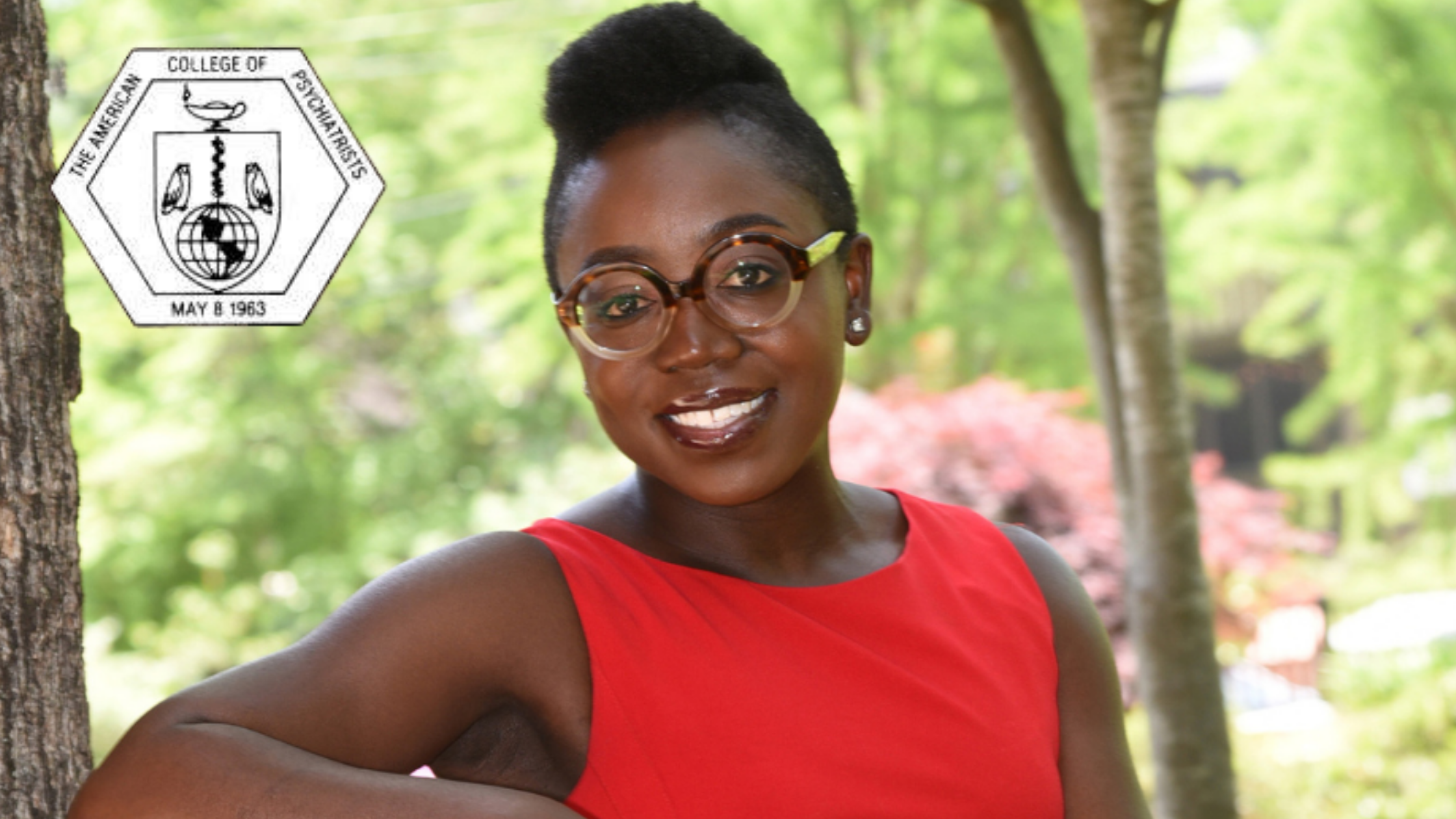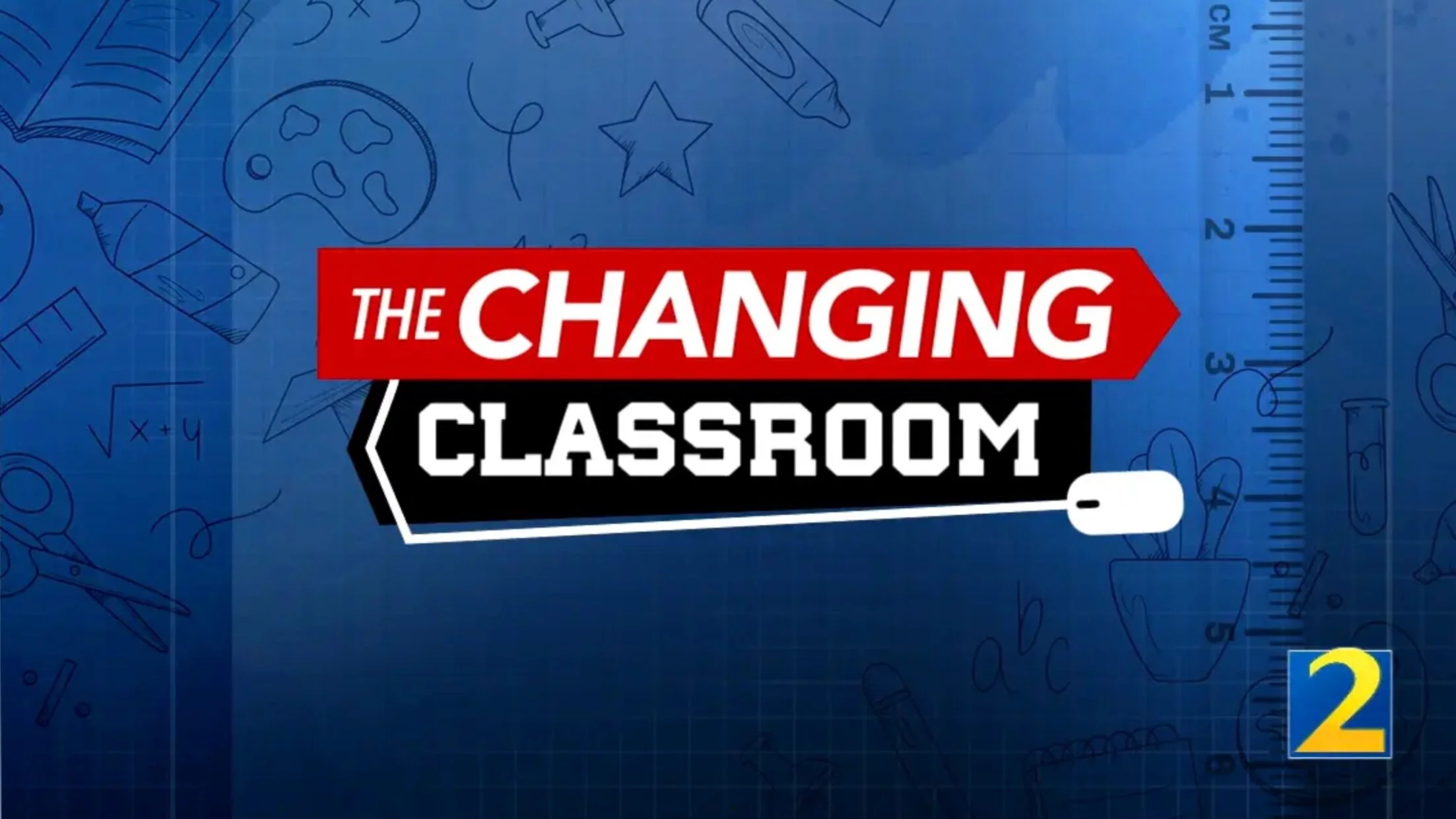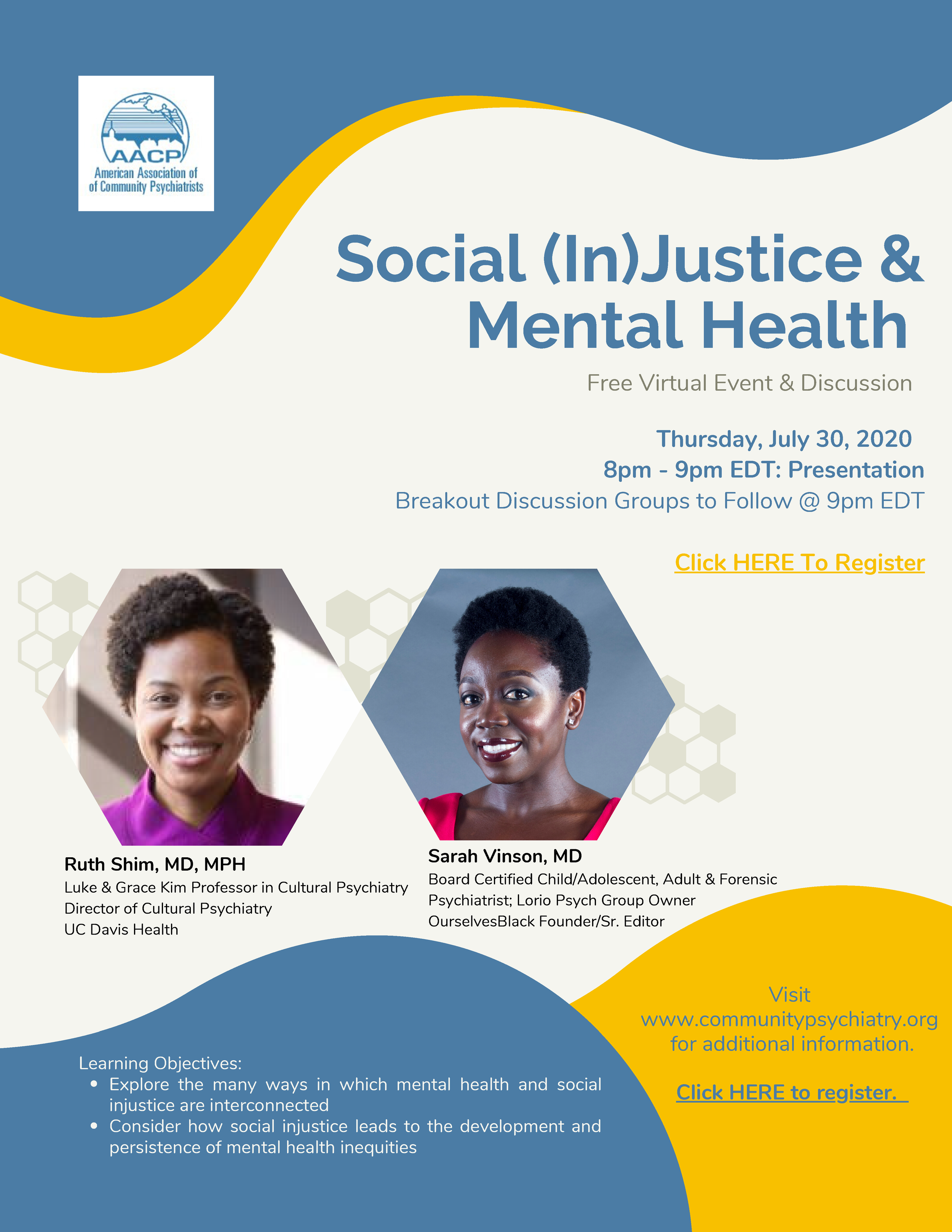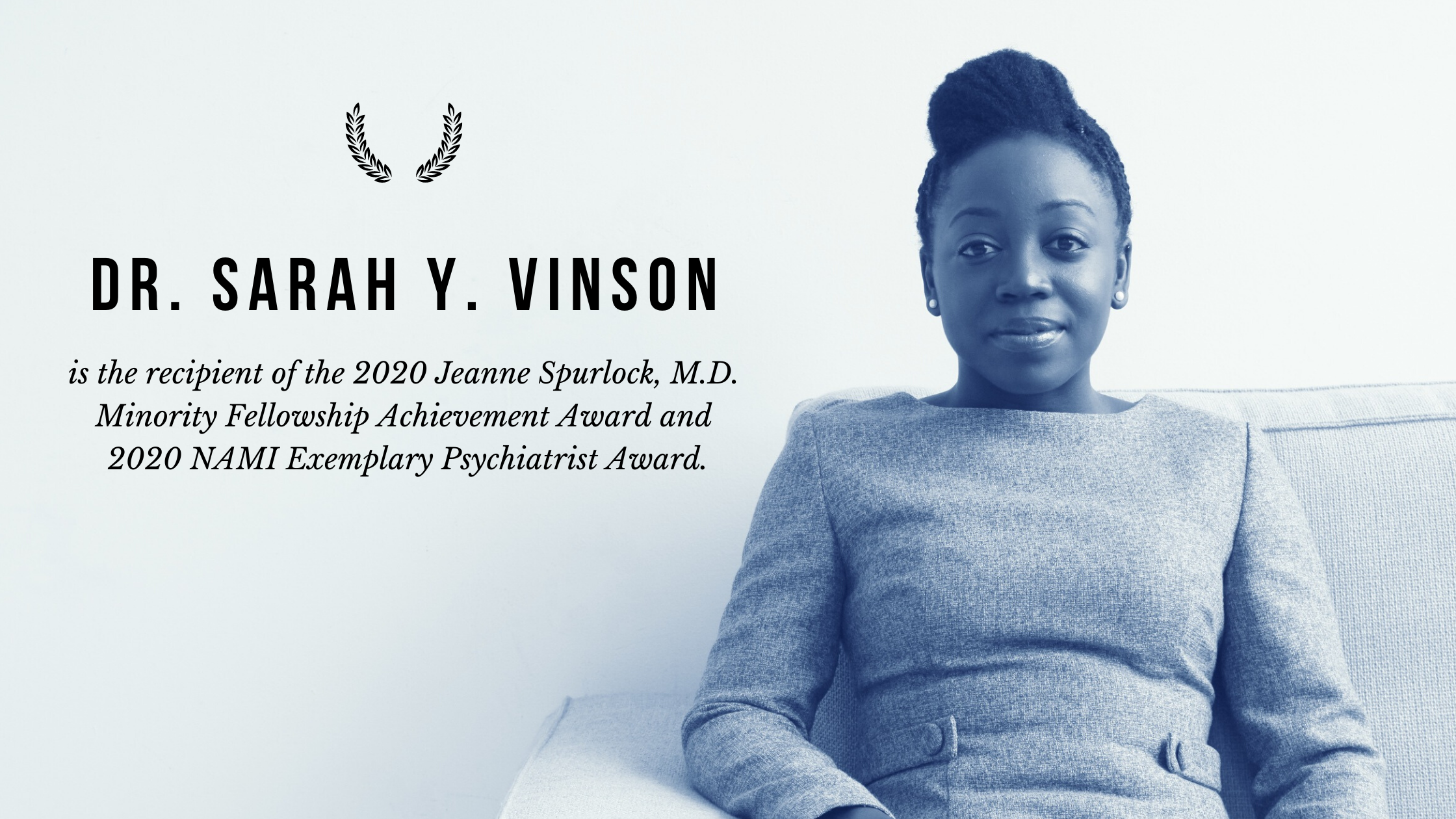On October 31, 2020, Dr. Sarah Vinson presented at Pediatrics on the Virtual Parkway: Halloween Edition––a virtual meeting hosted by the Georgia Chapter of the American Academy of Pediatrics.
The African American Behavioral Health Center of Excellence at Morehouse School of Medicine
On September 28, 2020, Dr. Dawn Tyus, the Director and Principal Investigator of the Southeast Addiction Technology Transfer Center, was awarded a five year 3.5-million-dollar grant by the Substance Abuse and Mental Health Services Administration (SAMHSA) to help establish The African American Behavioral Health Center of Excellence at Morehouse School of Medicine—an initiative designed to eliminate disparities and promote behavioral health and health equity for Black people.
Recently named the Medical Advisor, Dr. Sarah Vinson, M.D., F.A.P.A. will work alongside key stakeholders, scientists, and educators to create data-driven, transformational systems to help achieve the following identified goals for the CoE:
Increase the capacity of [Behavioral Health] systems to provide outreach, engage, retain, and effectively care for Black/African American (B/AA) people.
Improve dissemination of up-to-date information and culturally appropriate evidenced- based practices/approaches for B/AA people.
Increase workforce development opportunities focused on implicit bias, social determinants of health, structural racism, and other factors that impede high-quality care for B/AA.
Increase collaboration between the center and SAMHSA TTA providers, to infuse culturally appropriate information on B/AA people in all SAMHSA-funded TTA Centers.
For more information, visit africanamericanbehavioralhealth.org or email the center info@africanamericanbehavioralhealth.org.
About the Substance Abuse and Mental Health Services Administration
The Substance Abuse and Mental Health Services Administration (SAMHSA) is the agency within the U.S. Department of Health and Human Services (HHS) that leads public health efforts to advance the behavioral health of the nation and to improve the lives of individuals living with mental and substance use disorders, and their families.
The mental health toll of COVID-19 | Dr. Vinson joins CBS Sunday Morning
According to KFF.org, more than half of Americans believe their mental health has been directly impacted by the COVID-19 pandemic. With prescriptions for antidepressants rising by 14% since the outbreak, Dr. Sarah Vinson believes this these numbers reflect a natural response given the world’s current state of uncertainty.
In her interview with CBS Sunday Morning, Dr. Vinson explores—
Our reactions to the ambivalent coronavirus outbreak
The challenges both specialists and patients face as the country’s need for professional help continues to rise
How individuals experiencing changes in thier mental health should be cognizant of instinctual stress responses versus anxiety and depression disorders
To watch the CBS full segment, click here.
Dr. Vinson elected to The American College of Psychiatrists
Dr. Sarah Y. Vinson was recently elected to The American College of Psychiatrists. Membership to this esteemed organization is limited to approximately 750 psychiatrists who have demonstrated outstanding competence in the field and achieved national recognition in clinical practice, research, academic leadership, or teaching.
Congratulations, Dr. Vinson!
About the American College of Psychiatrists
Founded on May 8, 1963, in St. Louis, Mo., The American College of Psychiatrists (The College) is a not-for-profit honorary association dedicated to providing continuing education to its Members, promoting the latest advances in the specialty, and supporting the highest standards in psychiatry.
The Board of Regents, which is made up of six officers and nine other Board Members, is the executive council of The College. The Board administers all professional and business affairs of the association, and oversees The College's Member-driven committees.
Membership in The College is limited to psychiatrists who have demonstrated outstanding competence in the field of psychiatry, and who have achieved national recognition in one of the following fields: clinical practice, research, academic leadership, and teaching. New Members must be sponsored by Fellows or Members of The College who are personally familiar with their work and career.
To encourage involvement in The College, active Members are expected to attend at least one out of every three Annual Meetings. At age 70, Members may assume Emeritus status, at which point they are no longer required to attend meetings or pay dues.
Learn more at https://www.acpsych.org/home.
Two Systems, One Population: Achieving Equity in Mental Healthcare for Criminal Justice and Marginalized Populations
Historically, the mental health system has never been readily accessible, culturally responsive, or a reliable source of effective interventions for vulnerable, at-risk populations. While marginalized groups plagued by failing systems (housing, education, etc.) face greater risks of developing mental illnesses, the individuals within these populations are cycled through the criminal justice system at alarming rates.
The United States criminal justice system, whose incarceration rates have increased by more than 500% in the last 40 years, has a lackluster approach to addressing issues of mental illness. This, in turn, warrants serious consequences that result in the mass incarceration and criminalization of a declassed group.
In an article published in Psychiatric Clinic: Achieving Mental Health Equity, Two Systems, One Population: Achieving Equity in Mental Healthcare for Criminal Justice and Marginalized Populations, five subject matter experts, including Lorio Forensics consultants, Dr. Sarah Vinson, Dr. Courtney McMickens, and Dr. Nicole Jackson, breakdown the following:
The interplay of mental health and criminal justice inequities;
The historical context for the prevailing extant approaches to correctional mental health treatment;
And programmatic approaches to addressing these inequities.
Overall, mental illness affects society’s most vulnerable, “including but not limited to, people of color, lesbian, gay, bisexual, transgender, queer (LGBTQ+) populations, and the poor,” in a unique way. Although these groups are impacted by deeply-rooted systemic issues, making them more susceptible to traumatic exposures, they lack the ability to gain access to proper health care. Because of this, the authors of Two Systems, One Population argue that these disadvantaged peoples are likely to be placed in the criminal justice system because they are:
Highly visible to law enforcement because they are overrepresented among homeless populations;
More likely to be arrested for the same behavior and tend to stay in jail and prison longer and less likely to be approved for parole or probation;
And more likely to be re-arrested, particularly those with co-occurring illnesses.
Rectifying a multilayered issue of this enormity requires a response that begins a fundamental understanding of mass incarceration’s impact on mental health. This basic knowledge should foundational for all public sector mental health professionals. Outside of clinical settings, advocacy efforts and intersystem collaboration are imperative.
According to the authors of the article in question, patient-centered care and the medical ethics principle of justice insist mental health providers are “aware of criminal justice system inequities but are also actively working within and across systems to eliminate them.”
Click here to purchase and view this full article.
CONTRIBUTING AUTHORS
Sarah Y. Vinson, MD, corresponding author
Associate Professor of Psychiatry and Pediatrics, Morehouse School of Medicine
Principal Consultant, Lorio Forensics
Timothy T. Coffey, MS
Project Coordinator, Eleventh Judicial Circuit of Florida, Criminal Mental Health Project
Nicole Jackson, DSW
Forensic Mental Health Consultant, Lorio Forensics
Courtney L. McMickens, MD, MPH, MHS
Forensic Mental Health Consultant, Lorio Forensics
Brian McGregor, PhD
Associate Dir. of Research, Kennedy Satcher Center for Mental Health Equity, Satcher Health Leadership Institute
Assistant Professor of Psychiatry
Morehouse School of Medicine
Steven Leifman, JD
Associative Administrative Judge, Miami-Dade County Court Eleventh Judicial Circuit of Florida
Dr. Vinson Speaks on The Changing Classroom, A WSBtv Prime Time Special
Last week, several counties across the state of Georgia welcomed its students back to school. However, as we are still in the throes of the coronavirus pandemic, the start of this season was like no other. To highlight and expand on the debates surrounding each county’s decision to open schools in-person, virtually, or both, WSBtv aired its prime time special, The Changing Classroom, on August 11, 2020.
In this unique media event, Dr. Vinson joins a group of educators, school board representatives, and other professionals to discuss what these decisions mean in terms of mental and physical health for the students, parents, and teachers alike.
Dr. Vinson Presents Webinar for ADDitude Magazine | Cultural Considerations When Diagnosing and Treating ADHD in African-American Children
African-Americans are not a monolithic group. Like most racial groups in a given society, there are several factors that lead to an array of cultural differences, such as socioeconomic status, location, and gender. Therefore, it is imperative that specialists do more than follow conventional methods and practice real cultural humility when assessing, diagnosing, and treating for Attention-deficit/hyperactivity disorder (ADHD) in African American children.
As an invited speaker for the ADDitude Magazine webinar, Dr. Sarah Y. Vinson walked attendees through a series of key points that detailed some structural and cultural considerations that may impact the diagnosis and treatment of ADHD in African-American children and families.
In this webinar, Dr. Vinson explores the following:
Potential causes for both over and under-diagnosis of ADHD in African-American children
Structural barriers to ADHD diagnosis and treatment that disproportionately impact African-American families
The importance of trauma’s consideration in diagnosis and treatment in this population
Click here to view the webinar and download the presentation slides.
About ADDitude
Delivering expert advice and support, ADDitude has been a prime resource for families and adults living with ADHD and other related conditions since 1998. Their mission is to be “a reliable advisor and ally” to their readers while providing relevant information from trusted medical and mental health professionals as well as caring voices from people living with ADHD.
Dr. Vinson Joins The National Well Beings Tour | Supporting Youth Mental Health: Are Georgia Schools Ready?
On July 30, 2020, Dr. Sarah Vinson joined the first event of the national Well Beings Tour with Dr. Erica Fener Sitkoff, executive director of Voices for Georgia's Children, and Dr. Roy Reese, psychologist and director of Behavioral Health at Akoma Counseling and Consulting, to discuss youth mental health as Georgia prepares to reopen its schools during the COVID-19 global pandemic.
The national Well Beings Tour is a series of events scheduled to take place in 24 cities through 2022. Its mission is to bring together communities to address stigma and shed light on youth mental health and well-being. However, moderating this discussion was Sarah Prescott, Host of On Second Thought for Georgia Public Broadcasting, who asked the group to weigh in on one central topic: Are Georgia schools prepared to support youth mental health in the coming school year?
Click here to watch or listen to the full session.
AACP Social (In)justice and Mental Health Town Hall - 7/30 at 8 PM
Join speakers Dr. Sarah Vinson and Dr. Ruth Shim for this American Association of Community Psychiatrists (AACP) virtual town hall meeting on July 30, 2020 at 8 PM (EDT). The two will explore the parallels of social injustice and mental health as well as how such injustices perpetuate disparities in mental health.
To register for this free event please follow this link.
Dr. Sarah Y. Vinson Receives Jeanne Spurlock, M.D. Minority Fellowship Achievement Award and NAMI Exemplary Psychiatrist Award
We would like to formally announce that Dr. Sarah Y. Vinson, the Founder of Lorio Psych Group and Founder and Principal Consultant of Lorio Forensics, is the recipient of the 2020 Jeanne Spurlock, M.D. Minority Fellowship Achievement Award. This accolade presented by the American Psychiatric Association (APA) is awarded to individuals who are making or have made notable contributions to the profession and/or the minority community.
Additionally, Dr. Vinson was awarded the 2020 National Alliance on Mental Illness (NAMI) Exemplary Psychiatrist Award. Given to NAMI members, this award celebrates the achievements made by entities that support and advance the organization’s mission to improve the lives of people affected by mental illness.
